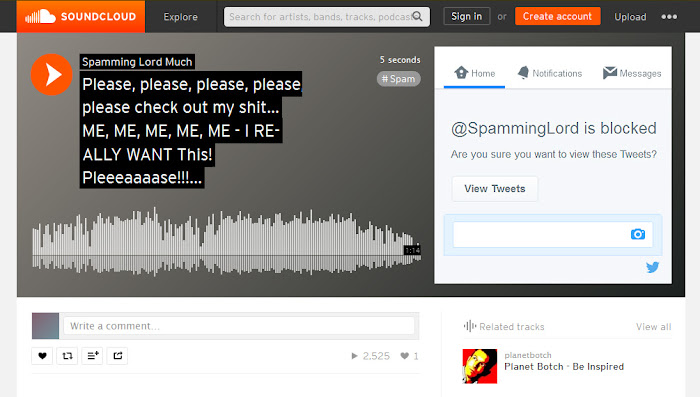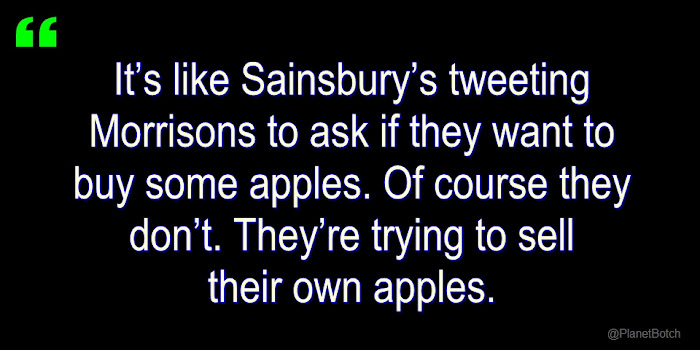
I must admit that, much as I love the way Twitter circumvents the problem of having to give out an email address for casual communication, and much as I like to watch a good Twitter row, there’s a lot about Twitter I think is awful. Spam, for example. Robotic spam, that Twitter doesn’t seem interested in doing anything about.
A significant proportion of this robotic spam emanates from hopefuls seeking a way into the music business. It’s sometimes referred to as Soundcloud spam, but it could just as easily be called Reverbnation spam or Bandcamp spam. It’s the culmination of musical creatives hammering other users with links to their music, and often, practically begging to be heard.
Whilst this is undeniably spam, it’s not the worst type of spam. Musicians are not, generally, like the besuited ‘digital marketers’, who paint on a smile and then spam on auto because they're bone idle and have absolutely no respect for anyone other than themselves. The musicians are spamming because they just don’t know how else to find an audience.
And most of them have created something worthwhile. They’re not trying to ride on the back of someone else’s work, as ‘digital marketing’ spammers do with their scraped (basically stolen) content. The musicians are putting hard work into their own material, and they’re frustrated that they don’t have a receptive outlet for it. So even though they are spamming, they’re in an entirely separate category from the grinning, good-for-nothing, copy-’n’-paste ‘digital marketer’. Indeed, many of the musicians are themselves being taken for a ride by professional dreambuilders and con artists.

BAD REP
This, however, does not mean Soundcloud spam, mass DM inboxing and other ‘battering ram’ tactics used by musicians are welcome. It doesn’t mean they’re not annoying. If you have a general policy of following back musicians on Twitter, and a lot of them are thrusting DM promotions into your notifications within moments of your button click, it does become pretty excruciating. And it’s damaging to musicians as a whole. If people come to associate following musicians with getting spammed, they won’t follow musicians. It’s happened in other genres of promotion, and it’s very difficult for a genre to regain trust once it gets a bad rep. Soundcloud spam on Twitter has been getting progressively worse over a period of years, and it has now hit crisis point.
SELLING TO COMPETITORS
Exacerbating the problem further, the majority of promoting musicians using Twitter will predominantly follow other musicians. So they’re not even spamming a potential audience. They’re spamming their competitors. It’s like Sainsbury’s tweeting Morrisons to ask if they want to buy some apples. Of course they don’t. They’re trying to sell their own apples.
So what’s the answer? What can musicians do to get noticed on Twitter without being annoying, alienating people or marketing to competitors?

SOLUTIONS
The most effective promotional tactics on the Internet involve ego-baiting. This can mean grovelling or arse-licking, but it doesn’t have to. At root, ego-baiting is just putting other people first, and highlighting their value, as opposed to your own. And it’s so vital a component in online success, that giants of the Internet even do it by proxy. They deploy 'Like' buttons and other facilitators of digital applause, so that masses of users can cast the ego-bait on the sites’ behalves. It works staggeringly well. Socially-driven sites get unfathomable numbers of logins from people checking for ‘digital applause’. Ego-bait totally drives sites like Facebook and Twitter.
But ego-baiting is the opposite of what most musicians are doing on Twitter. And ironically, it’s the absence of savvy in this exact area which is allowing so many musicians to be exploited by dreambuilders. Where musicians should be gently ego-baiting others, many are allowing others to ego-bait them.
This, however, is only natural. When you’ve dedicated a lot of time (and very probably money) to a project, you’re likely to be proud of it, and that pride leaves you wide open to ego-baiting. When you’re creatively inclined, in a world where the majority of other people aren’t, the tendency is for you to see yourself as the one with greater value, to struggle to see why others would not be interested in you, and to find it hard to ego-bait others without sounding sarcastic.
But other people see a very different picture, in which they are the important one, and you don’t matter at all – until you change their mind. Changing their mind almost always takes some degree of ego-baiting.
SOFT EGO-BAITING
Ego-baiting can be as simple as agreeing with someone else’s statement, and that can be an incredibly effective tactic on Twitter. So a good first step for a promoting musician would be to Twitter-search topics of personal interest (perhaps using hashtags), read people’s tweets on those topics, and then express agreement where appropriate. Simply ‘Liking’ the tweets doesn’t typically build much engagement (partly because a lot of people are suspicious of automated Likes). Replying is much better, especially if you can add something of your own to the conversation. If, in the course of this, you can connect with fans of music that’s similar to yours, so much the better.
I shouldn't need to say this, but I will just in case... DON'T INCLUDE A F***ING SOUNDCLOUD STREAM IN YOUR REPLY!
NO REPEAT!
Repetition of any kind should be avoided in this process. When you reply to a real user’s tweet, he or she is very likely to check your page, and if you’ve said the same thing to everyone, or you look like you’re effecting a cheap ploy, it’s going to flip the off switch. If your communication looks natural, this kind of soft ego-baiting does work (one guy I saw managed to get hundreds of retweets for a single, well-worded reply which really captured the mood). But there can be a very fine line between natural and fake, and most people will instantly reject anything south of that line.

THE BONDING PERIOD
Another clever tactic I’ve seen in the marketing of creative work is the setting of a ‘bonding period’. This is a preset period of time in which the promoting individual(s) will completely avoid promotion of their product. The idea is to combat the severe dampening effect that a self-serving motive has on the progress of a Twitter account.
If people think you just want to sell them something or to pester them for attention, they probably won’t want anything to do with you. They may follow you to secure your follow of them, but they’re unlikely to retweet you or reply to you, and they may put you on Mute. But if they can’t see an obvious self-serving motive, they’ll assume you’re there for the same reason as them. That makes them care.
In an evironment that’s overrun with people trying to promote stuff, being someone who’s just there for being there has great value. It should get you more genuine interest, more communication, more retweets, more engaged followers… And the negative points? None.
So during the bonding period, the musician or band will entirely refrain from promoting their music. All they do is chat, post pictures of themselves in everyday situations, follow ordinary people, reply to ordinary people’s questions or statements, etc. No “Have you seen my/our Soundcloud/Reverbnation?”, NO LINKS to music tracks, NO DMs!!!! People will read a Twitter bio if they’re interested in the person and want to know more. That’s what it’s there for. Twitter also has a space for a web page link. For the duration of the bonding period, that’s the only place on Twitter that the musician/band puts a link… Unless someone asks for one – in which case it’s forwarded as requested.
“I’LL DO ALL THE TALKING!”
"I'll do all the talking!"... That’s what one bandleader used to say to me when we went to negotiations or local press interviews. And it’s a good job he did. I was a teenager at the time and not particularly brimming with people skills, to say the least. He was in his mid twenties and good at selling.
It makes a lot of sense in a band situation to let the most socially adept member of the team (not necessarily an actual band member) do the talking on social media. You may say: “Oh, it’s only Twitter – how hard can it be?” But Twitter is an extension of real life. It is absolutely the case that people who connect and socialise well in the offline world will do the same on Twitter. Get the best talker running the Twitter, and don’t let the worst talkers anywhere near it.
IN CONCLUSION
Ultimately, it should never be imagined that music is going to speak for itself, or that thrusting Soundcloud streams into random people’s faces will prompt them to care. Spam is spam, no matter what the value of the product, and if musicians don’t stop spamming, the current and future generations of hopefuls will find it increasingly difficult to connect with a real audience.
I’ve seen from running a wide array of blogs, that there’s a big difference between what people say, and how they behave. My most ‘digitally applauded’ posts have frequently been among the worst performers for real, cut-the-crap, hard interest in the blog visit and reader engagement stats. Meanwhile, some of my best performing posts, linked to across the Internet and clearly popular in real terms, have received nothing more than one or two +1s in the ‘digital applause’ stakes.
So it’s all bullshit. 90% plus of digital applause is ego-baiting. And as this steadily dawns on you, you realise that ego-baiting is the key to online success. That’s why people do it. The point at which you stop shouting “ME, ME, ME!”, and start thinking about other people, is the point at which promotion starts to take care of itself.

